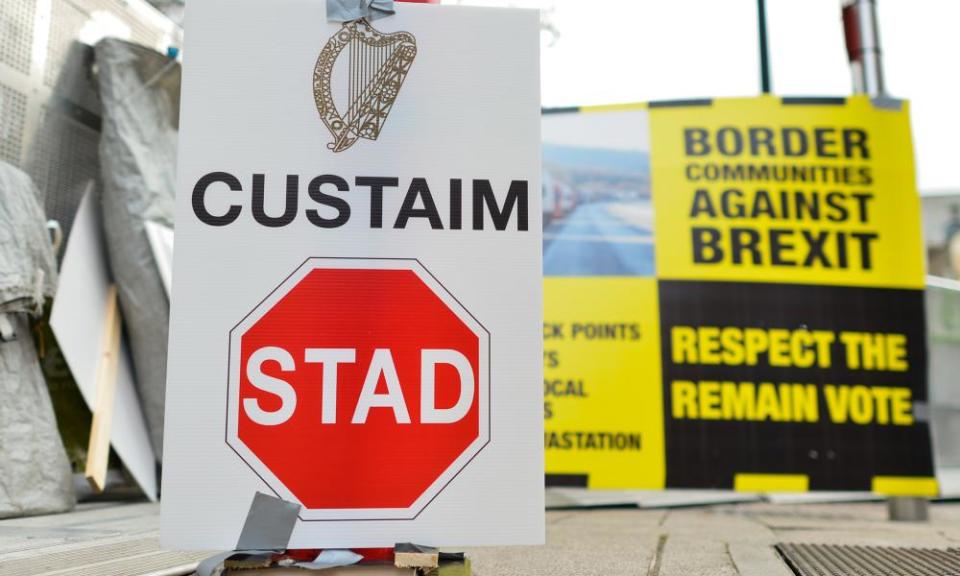UK government rejects EU claim that its Brexit customs plan is 'fantasy'

The UK government has dismissed claims that its plans for a new customs relationship with the EU are a “fantasy” as it restated its opposition to the reintroduction of checks at the border between Northern Ireland and the Irish Republic.
The Northern Ireland secretary, James Brokenshire, said the government’s plans to minimise customs checks with the EU after Brexit were realistic and that Guy Verhofstadt, the European parliament’s lead Brexit negotiator, was wrong to describe them as unworkable.
Theresa May used an article in the Belfast-based Irish News, a nationalist newspaper, to reassure nationalists living in Northern Ireland that Brexit would not see the UK turn its back on its “unique and special relationship” with Ireland.
On Tuesday the government published a document offering two suggestions as to how the UK could minimise border disruption when it leaves the EU customs union after Brexit, prompting Verhofstadt to say that wanting to be in and out of the customs union at the same time and to have invisible borders was “fantasy”.
The issue is particularly sensitive in Northern Ireland, where there are fears that Brexit could lead to the return of border checks. On Wednesday the government is publishing a policy paper specifically addressing Irish border issues that will say there will be no need for border posts between Northern Ireland and the Republic after Brexit.
In an interview with the Today programme, Brokenshire rejected Verhofstadt’s critique. “I don’t accept that [the government’s plan] is a fantasy,” he said.
It was not “unrealistic” to claim that there could be a frictionless border between the Irish Republic and Northern Ireland after Brexit because it was in the interests of both sides, he went on.
“This isn’t just some sort of unilateral, one-way issue that I’m talking about here. When you look at the trade that the UK has with Ireland, around £13.6bn, but equally the trade from Ireland to the UK, around £9.1bn. It is that flow of trade that we do see in both directions, which is why this matters for both of us.”
He said that 80% of the trade crossing the border between the Irish Republic and Northern Ireland was from small business. “It is not international trade at all. It is actually about business operating in local markets, which is why we think there is a strong, compelling case to see that exemption,” he said.
Pressed on how the UK could manage without border checks once it was outside the customs union, he said there were already systems that allowed customs declarations to be made by pre-registration. He said that technology was part of the solution, but also that it was not just about technology, and that regulations and exemptions would play a part too.
The paper being published on Wednesday will say that the government’s top priority is the avoidance of checkpoints or any other physical infrastructure at the border between Northern Ireland and the Republic.
In her Irish News article, May said: “There should be no physical border infrastructure of any kind on either side of the border between Northern Ireland and Ireland. I want people to be absolutely clear: the UK does not want to see border posts for any purpose.”
She said Brexit would not undermine the relationship between Britain and Ireland.
“No one voted to end the special ties between the UK and Ireland or to undermine the unique arrangements between Ireland and Northern Ireland which have underpinned the peace process and have been in place well before our membership of the EU,” she said.
Sinn Féin’s Brexit spokesman, David Cullinane, said the only logical solution for Northern Ireland was special status within the EU.
“The reality is that it is beginning to dawn on British government that Brexit means Brexit. You cannot have a shower and not get wet and that’s what the British are trying to pretend – that you can be inside and outside [the EU],” he said.
His remarks reflect a concern within the nationalist community in Northern Ireland that something as sensitive as the border issue is being decided in Westminster and not in the Stormont assembly, which collapsed in January.
How might an invisible border operate?
Where does the land border lie and where are the busiest points?
Why is the Irish government so opposed to an ‘invisible border’?

 Yahoo News
Yahoo News 